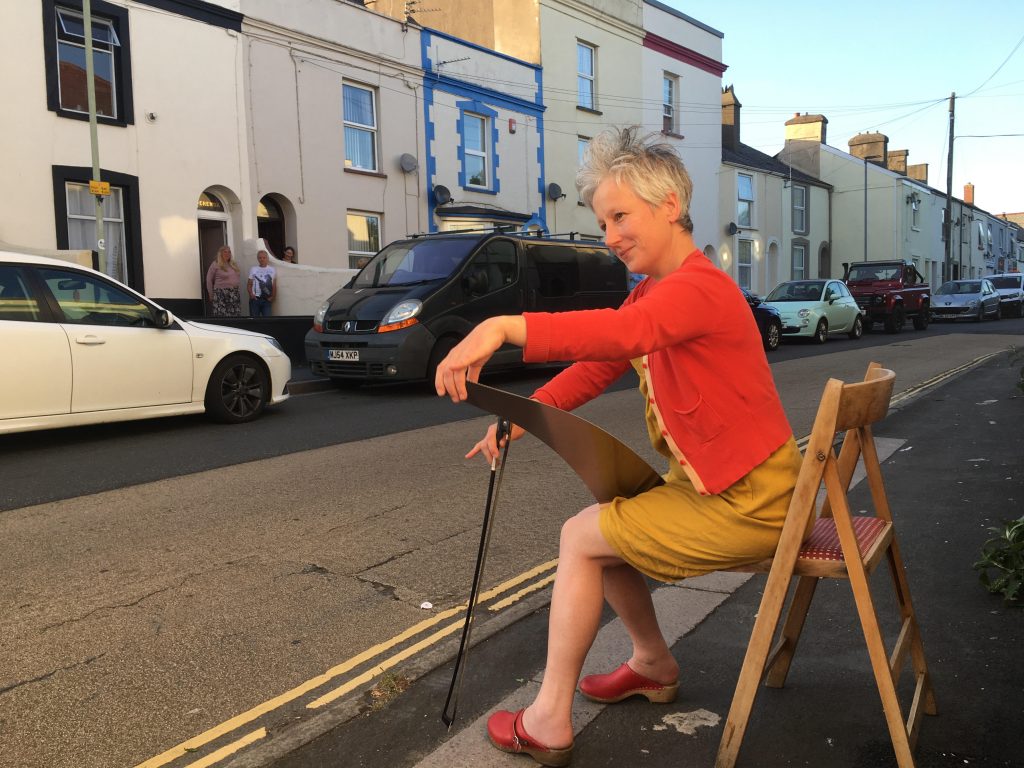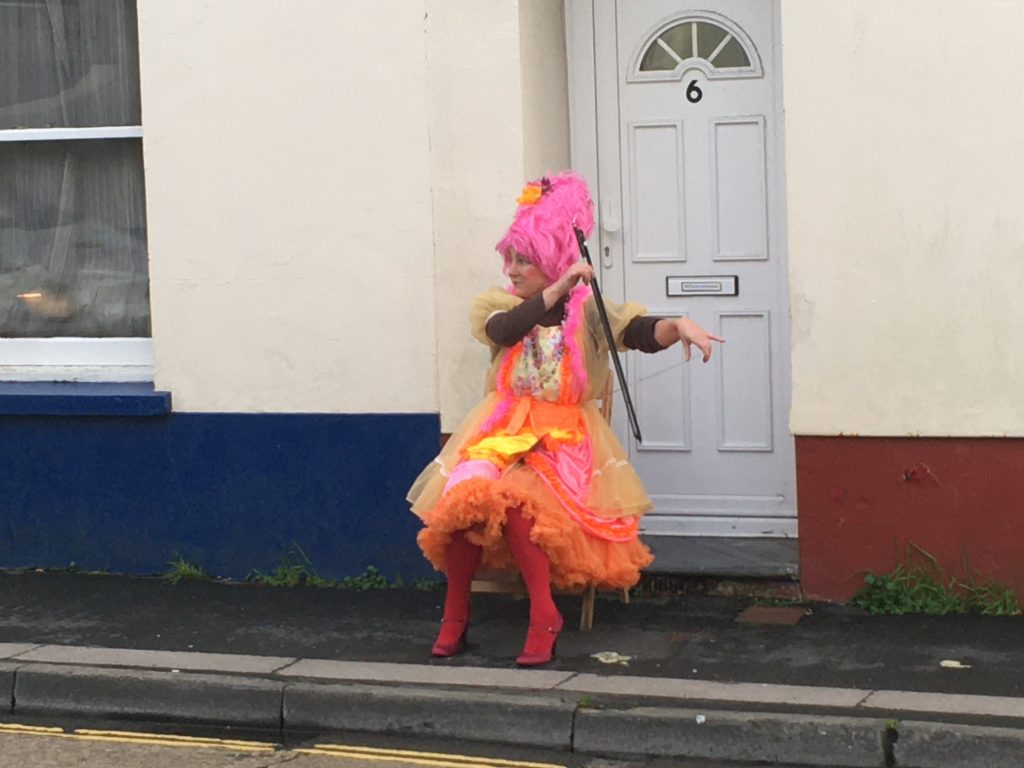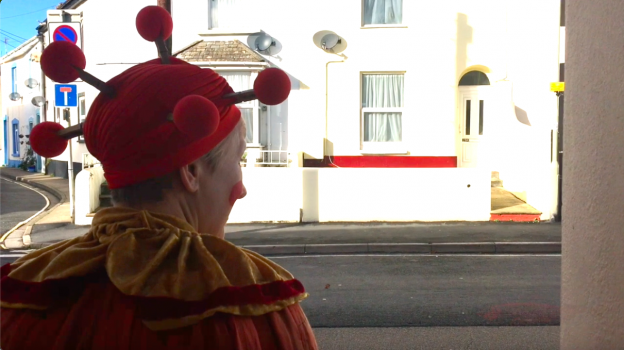Paschale Straiton reflects on current times and sees an opportunity to rethink the role of the artist in our communities
A few times this past year I’ve experienced a new twist to the psychological condition inherent in being a performer: that strange slippage between being ‘off’ and ‘on’, between the private, domestic me and the public, showbusiness me. I open up my front door –the most direct extension of private space – and step out into the street, in costume and performer mode. I’m playing music, contributing to the atmosphere of the clapping for the NHS moment. My boyfriend and I are making a short film and pandemic restrictions have confined our location to our street. I’m performing in the park, and my home is the only Covid-secure changing space. I’m dressed up like a giant Covid virus. What will the neighbours think? And what opportunity does this newly discovered experience present to me and to my tribe of predominantly touring artists?
For the time being at least, touring is severely restricted by Covid-19. Hopefully opportunities to travel and mingle will flourish with the spring in 2021 and the news of various vaccine developments are cause for optimism. In the meantime, the abrupt halt to normal proceedings has given us time to really take stock…
A bit of context: I am what the Arts Councils of England, Scotland and Wales call an outdoor artist (15 years ago I was called a street theatre performer). It’s one of those awkward definitions that are difficult to explain to almost everybody else, including my neighbours. I don’t make plays that happen in the park. I’m not a human statue. In fact I don’t busk at all. My career and that of Red Herring Productions (a company that I founded and now run with Kim Tilbrook and Fiona Fraser Smith) has been dependent, to a great extent, on a network of arts and community festivals. We make performance that’s accessible, engaging, funny, and that has an element of participation. Companies like ours are booked by arts festivals, for a fixed fee, to perform in public spaces – street corners, civic parks and sea fronts.
The festival circuit was widely flourishing before the glorious splurge of the Cultural Olympiad in 2012. The flagship arts festivals in places like Winchester, Brighton, Norwich, Greenwich and (brilliantly unlikely) Stockton-upon-Tees still flourish – many of whom come together for commissioning purposes as the Without Walls Consortium. However, the rich tapestry of smaller community events run by local councils across the country that really served as the bread and butter for most companies, rapidly unravelled as years of cutbacks meant that arts officers disappeared and money was no longer available for outdoor events. Organisations like Creative People and Places and private shopping centres have helped to fill the gaps in many parts of the country but overall, the massively diminished touring opportunities means that there is great competition for work amongst companies like ours.
So touring is tricky. Beyond Covid, touring in Europe is going to be affected by Brexit. The way in which we tour – our diesel vans, mileage and tonnage – needs to be reconsidered in terms of its effect on climate change. Touring is really tricky. But rather than going too far down this complex rabbit hole that I could definitely get stuck in, I’ve turned to Albert Einstein: ‘In the midst of every crisis, lies great opportunity.’ What are the new opportunities in this proverbial kettle of fish?

Talking with a range of outdoor artists through a string of zoom conversations from March onwards, facilitated by The National Association of Street Artists (NASA-UK), Outdoor Arts UK (OAUK), Emergency Exit Arts and others, the term ‘Hyperlocal’ has hung in the air. This rather technical word brings with it an interesting provocation, in terms of how we might reconsider our range or sphere of influence. What would it be if I redefined myself or we defined our company as ‘In Residence’ in our town, postcode, or street?
I’m fully aware that the tradition of community or participatory artists, working for and with their local communities, has been alive and well for decades. And there have been times when community and outdoor arts sat firmly in the same camp. Welfare State International, the company that I identify as The Daddy of outdoor arts practice in the UK, was profoundly enmeshed in the community of Ulverston in Cumbria. Companies that they spawned, like Emergency Exit Arts in London, Walk the Plank in Manchester, and Same Sky in Brighton, preserve strong connections to the communities in which they are based. However, the vast majority of outdoor artists rarely perform in the town or city where they live. But we share similar processes with our community counterparts.
In general, outdoor artists operate in public spaces. Some audience members may turn up specifically to experience an event – especially where event producers have worked hard to build up audiences over time. But in public space, other people are naturally going about their business and are unsuspecting of theatrical events happening around them. An unsuspecting audience member on their way to the supermarket will not have anticipated that they might step into a moment of make-believe, as a spectator or as a participant. In order to turn their ‘unsuspecting’ into a ‘confirmed’ audience member status, quite a bit has to happen and fundamental to this is the performer’s ability to adopt what American Psychologist Carl Rogers called an attitude of ‘unconditional, positive regard’. When we meet people in a space of equality and open-heartedness, we make way for trust and make it easier for them to take a leap of faith – whether to stay to watch and risk their parking ticket or to go that extra leap and join in. When people do decide to make that leap, everyone is surprised, and with surprise comes a delight in a sense of shared liveness. Tony Lidington of Prom Prom Productions calls these moments WIAAs or What It’s All Abouts. Following his lead, I count up these moments – the day’s greatest hits – and have come to realise what social value they represent. And no doubt these are the moments that sustain the community artist too.
At a time when isolation is rampant and people are aching for connectivity, performance – and the opportunity for people to get close or participate in it – will play a fundamental part in healing our communities, not just from Covid 19 but from the numerous agents of division that have come to force this year. Is it contingent on us, as experts in connection, to step up like a cultural front line, to offer our services more determinedly in the communities where we live? Such questions have been asked by Dana Khoval Segal, fundraising consultant and trustee of Emergency Exit Arts, and by outdoor arts dynamo Liz Pugh from Walk the Plank. It’s a call to arms that is echoing in my bones.
For the Covid-considered present, doorstep or street corner performance brings theatre to people rather than asking them to congregate in town squares or parks. Many artists and organisations used this as a springboard for activity this summer. Emergency Exit Arts encouraged artists in their stable to facilitate socially distanced street parties in SE London. The Bristol Coddywomple was an experiment crafted by Gwen Hales, which coordinated performers across Bristol to perform in their local neighbourhoods on the same Sunday afternoon. Assemble: The Caravan, brainchild of Madeleine O’Reilly, was a procession of local performers on bicycles and open-topped vehicles through residential areas of Hull. While most of their activity happened online, The Festival of Thrift in Redcar worked with local theatre company Whippet Up to create the Thiftmobile, which brought a bit of festive spirit to people in residential areas of Redcar and Cleveland.
If companies like ours were to embrace the hyperlocal (at least in part), how might this work financially? Arts Council England’s new strategy Let’s Create is a rallying call for artists to enable the general public to have a more visceral or hands-on experience of the arts. So surely the appetite for hyperlocal work is growing at a time when the seed bed has been prepared in terms of lottery funding.
Some artists are looking for more determined action from the government. In 2016 Martin Daws (community artist and spoken word poet, including People’s Laureate for Wales 2013–2016) shared his vision for artists to be employed to work full-time in their local communities. ‘Instead of a £50m art venue, a city could pay 200 artists £25k a year for 10 years to work with communities.’ Stephen Pritchard (community artist and academic) has followed suit, working out that if every resident of Greater Manchester paid £2.56, the £9 million total raised would employ one artist for each of the 287 electoral wards £25k for one year, with additional budget for the support of administrators, producers, and curators and materials. These arguments are grist to a cultural commons shift that is completely in line with ACE’s strategy. Would they be bold enough to consider it?
If such ideas prove too radical and artists have to become more self-determined, how could the economics work in a hyperlocal context? Many outdoor artists across the country have been involved in mutual aid groups, and have led or joined food box distribution schemes. Most of these artists have become more socially networked in their neighbourhoods than ever before. What if these artists gathered together professional storytellers, musicians, dancers and circus artists in their town, district or region, to create a hyperlocal touring menu for their neighbourhoods and promoted the notion of the street party – Covid permitting. There are experienced, outdoor artists dotted across the country who have experience of risk assessments, the know-how to apply for a license to close a street, and to conduct themselves responsibly. And for those that need help there’s plenty available in support organisations like NASA-UK and OAUK. Local networks wanting a street party could club together, perhaps on the basis of Pay What You Can, or Pay Ahead for those who can’t, pooling enough to pay for some quality, local entertainment. A wonderful set of individuals at The Busking Project have designed a simple and free cashless payment system which means that people can donate with ease and Covid safety. Some companies like Fun in the Oven Theatre (based in Bristol and Newcastle) have already started to explore the idea of a performance home delivery service for their work. And I’d be fascinated to hear about similar initiatives that are no-doubt happening across the country. Perhaps such initiatives are something that Arts Council England would be interested to support…
As I mentioned above, the moniker of ‘outdoor artist’ is peculiarly elusive. People who live in places that don’t have arts festivals with an outdoor programme don’t really understand what it means. Most indoor artists don’t even understand what it means. And yet the art of performing and connecting in public spaces is what we’ve done forever. Perhaps, getting beyond my own psychological muddles, there’s something useful and pragmatic about stepping out of my door in full costume and performer mode, presenting myself as a neighbourhood asset that’s oven ready for fun.
Paschale Straiton is artistic director of Red Herring www.redherringprpductions.co.uk
Paschale participated in the Total Theatre Artists as Writers programme 2020 www.paschalestraiton.wordpress.com


